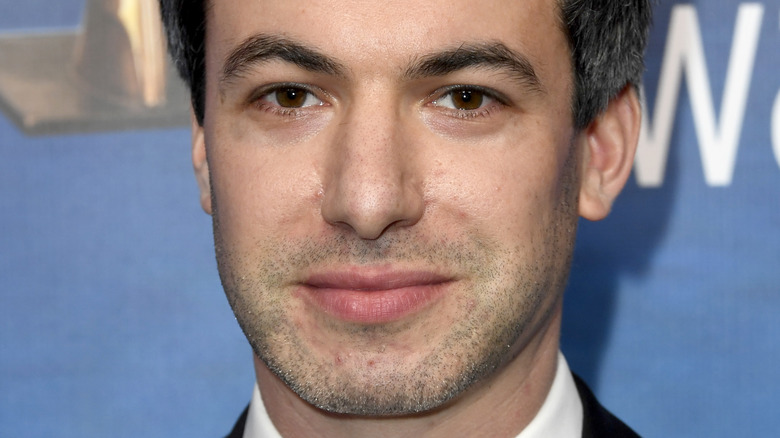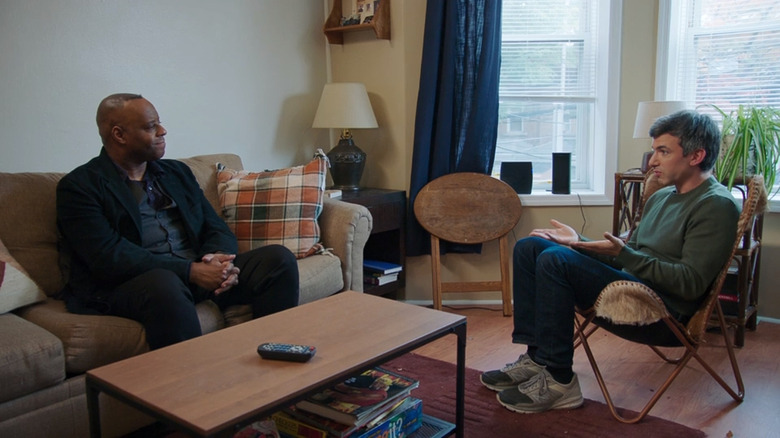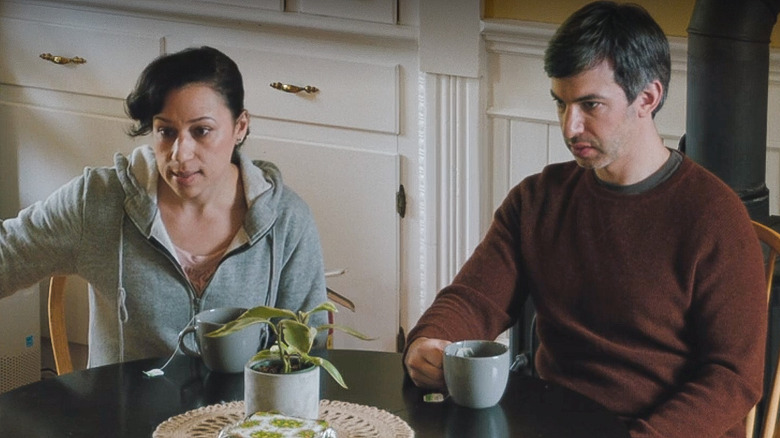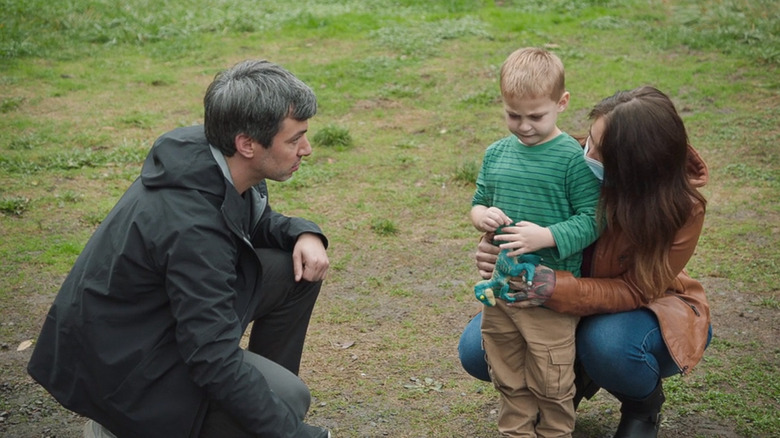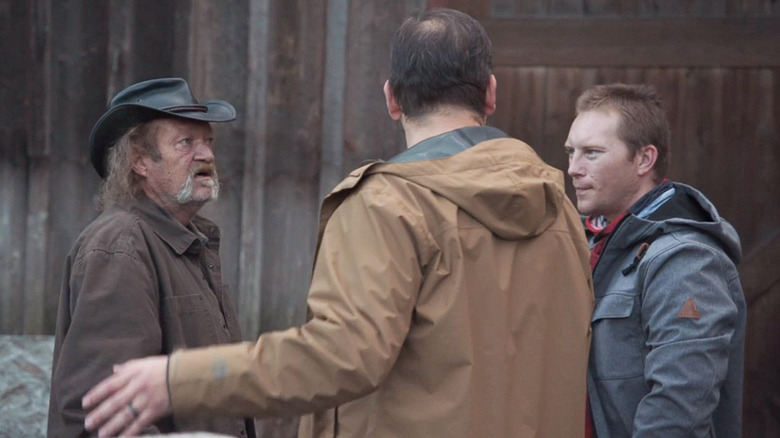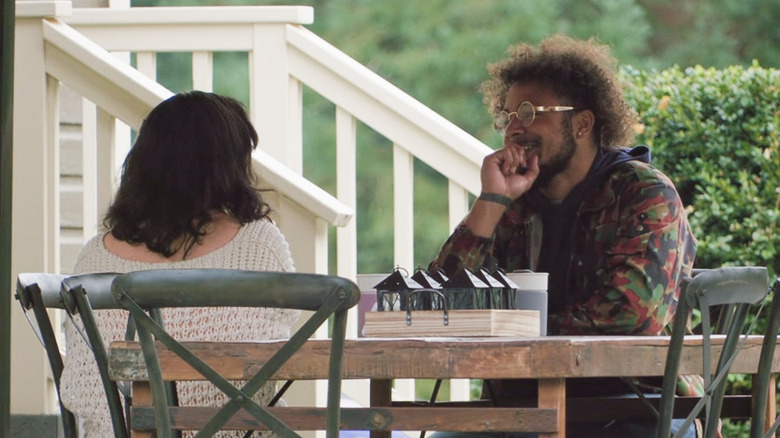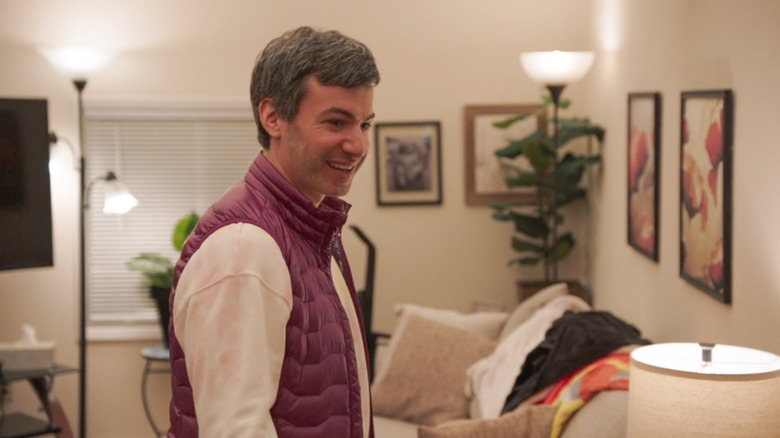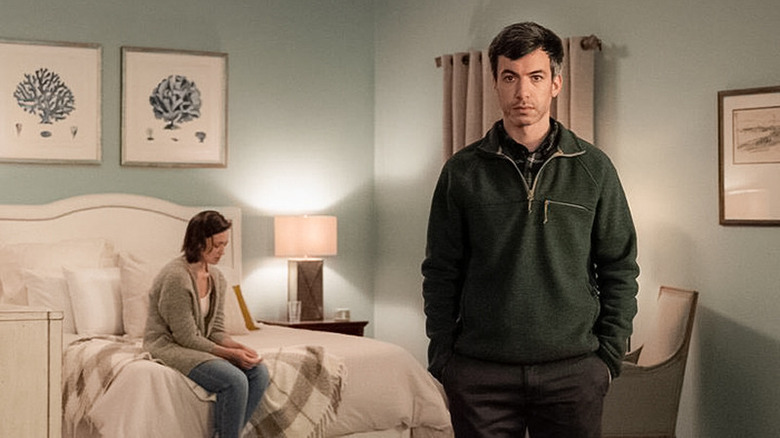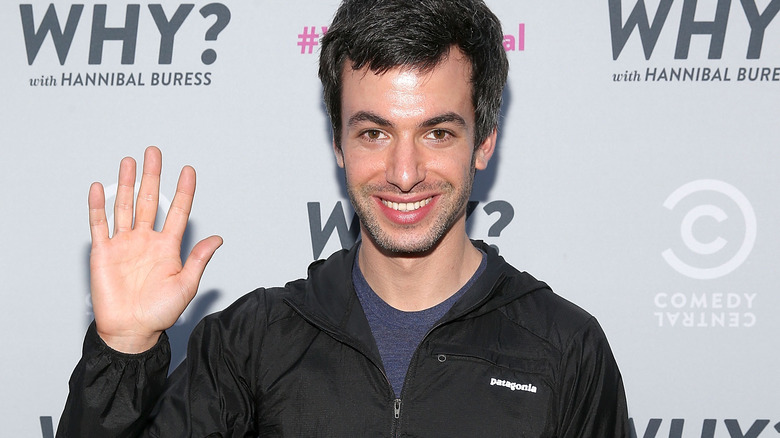The Rehearsal Breaks Every Rule Of Media Ethics, But You Should Watch It Anyway
Barely a half minute into the first episode of "The Rehearsal," creator and host Nathan Fielder clues viewers in to the cringefest to come. "I've been told my personality can make people uncomfortable," he narrates. "Humor is my go-to instinct, but every joke is a gamble." Most of the attempts to crack wise that Fielder keeps for the final edit fall pretty flat, but those are the gentlest spiritual violations that "The Rehearsal" commits.
The premise centers Fielder in a series of social experiments wherein subjects rehearse a critical upcoming moment or phase in their lives. After the first episode, which focuses on a trivia buff with a long-held secret, "The Rehearsal" largely centers on a woman named Angela and her desire to practice at motherhood. Fielder ends up placing himself inside the experiment as her mock co-parent, raising a whole host of ethical questions he seemingly ignores. But despite its obvious and blatant violations of the rules of sound media practices — and perhaps in part because of them — "The Rehearsal" is a unique and fascinating must-watch.
Fielder breaks a lot of eggs to make his omelet
"The Rehearsal" defies simple categorization; it's equal parts reality show and docu-drama, with a dash of good old manipulative storytelling thrown in. Fielder is not reporting the news, but he does rely on the contributions of non-entertainers to craft his show, leaving the Society of Professional Journalists' Code of Ethics as the most useful and appropriate guide for judging whether "The Rehearsal" goes too far to deliver its muddled message.
Fielder drives the train off the rails immediately, using a fake utility crew to invade the house of his first subject, Kor Skeete, a teacher who has been lying to his trivia team about a nonexistent master's degree for years. Fielder's subterfuge is deception for its own sake, as Skeete had already agreed to be a part of a reality television experiment and would certainly also have allowed the crew into his house.
The SPJ Code specifically states, "Avoid undercover or other surreptitious methods of gathering information unless traditional, open methods will not yield information." But Nathan Fielder isn't Walter Cronkite, and he shouldn't have to hold tight to every single rule of ethical journalism for his show to pass moral muster: few programs on the entertainment side of the fence do. But as a thinking and feeling human being Fielder should feel bound to its strongest pillar: "First, do no harm." And while he is certainly free to jerk audiences around willy-nilly for the sake of entertainment, he has a much bigger responsibility when it comes to the welfare of the real human beings who inhabit "The Rehearsal."
A parenting experiment goes off the rails but Fielder keeps the train moving
Although initially it feels like "The Rehearsal" will follow the pattern of "Nathan For You" and bring us a new subject in each episode, the focus soon lands and remains on Angela, who seizes what must have seemed at first glance to be a unique and intriguing opportunity. The experiment Fielder sets up for her mimics her ideal life: a son named Adam, a big house with land for her vegetable garden, and time and space to operate her home business.
It's pretty much a disaster from day one, and Fielder throws gas on the fire when he joins the experiment as her co-parent midway through. Soon their religious differences and his constant lies pile up higher than she can tolerate and she leaves the experiment. Logically this should have been the end of that particular rehearsal, but Fielder continues on as a pretend single dad to multiple fake children.
A series of rotating child actors were hired to simulate Adam's growth to age 18 over two months, and California child labor laws limits the length and frequency of shifts, so several performers were used for each stage of growth. One of the six-year-olds, Remy, loses the boundary between his job as an actor and his relationship with his fake dad, and on wrap day has a breakdown where he refuses to leave the set or stop referring to Fielder as his father.
It's impossible not to feel Remy's pain
Remy's mother Amber shares her son's real-life sadness at not having a father figure in his life, breaking the hearts of viewers right along with the usually emotionless Fielder. There is real anguish in Remy's tears, and it takes some repeated visits from Fielder and another one of the actors who played Adam to shake Remy from his fantasy. It's impossible to ignore the real damage Fielder's vanity project has done to this innocent boy, especially when Fielder holds it up front and center for viewers to make sure we don't miss any of it. If there's any redemption for him here, it's that he appears to be willing to highlight his own errors and flaws among those of others.
It's clear he's trying to show us something, but there are so many pivots that it's sometimes hard to tell in which direction he wants us to look to find it. With the constant lies and no happy endings, the moral could be simply not to trust anyone, including Fielder himself. The children who played Adam, their parents, and the earnest actors pulled into Fielder's fake class are really the only sympathetic characters in "The Rehearsal," so perhaps it's just a self-immolative cautionary tale about appearing on reality TV. "The Rehearsal" will certainly make it harder for him to rope in subjects for his next project.
A strong thread of dishonesty runs completely through The Rehearsal
It's the constant unnecessary lying that grates most on the soul when watching "The Rehearsal." In one Episode 4 exchange, one of the actors Fielder has brought in for his fake acting class confesses that one of the lessons makes him uncomfortable because he doesn't like being dishonest. Fielder claims he doesn't either, but even that is a lie — he either relishes living in deception or can't seem to avoid it. He is disingenuous with nearly everyone who signed the non-disclosure agreement necessary to appear on the show, and even Angela eventually calls him out. She tells the tutor Nathan hires to teach Adam the Jewish faith, "He likes to manipulate people. It's hard for him to be honest. Nathan has a problem with lying. He lies a lot."
Fielder concocts a lie within a lie to presumably help a man named Patrick free an inheritance from a reluctant brother, using former Alcohol, Tobacco, and Firearms agent Vincent A. Cefalu to play Patrick's fake brother's fake grandfather. There's some unnecessarily humiliating diaper maintenance, and Patrick seems to put the pieces of Fielder's deception together pretty quickly and bails on the show.
Cefalu told The Daily Beast, "I had some misgivings ... Just because the ruses that we were pulling on people — that fake environment, that fake set-up to accomplish what he wanted to accomplish." He shows more emotional savvy than Fielder in reaction to Patrick's departure, saying "I sure hope that him stepping away from the show was just personal ... and not something that I played a part in. Getting beat down, watching him cry and all that was a little — whatever."
At least one person who appeared in The Rehearsal isn't happy about his portrayal
In Episode 2, Angela invites a man she meets on a dating site, Robbin Stone, to join the experiment as her mock partner. He's painted as a numbers-obsessed, irresponsible stoner who can't make it through a single night of a baby's crying, but Stone likely broke the terms of his NDA in speaking to Vice to set the record straight. "I think they really, like, changed my personality," he said. "The portrayal is just completely aimed at making me look bad."
Fielder even points the camera at himself, literally and figuratively, to show us he knows he is being deceitful. In one scene from Episode 4, he is watching an episode of "Hermie and Friends" with one of the faux Adams: together we hear an exchange between Hermie (Tim Conway) and Max Lucado where the caterpillar tells the human that because he has admitted to lying, that he cannot be trusted anymore.
If wanton and needless dishonesty are the core of "The Rehearsal," casual disdain for the emotional well-being of others is its shell. It's one thing to cast a six-year-old in a commercial or sitcom where there are clear boundaries between the role and their home life, but it's yet another to place a child in a situation where those lines are blurred so thoroughly that he loses sight of them.
Fielder seems willing to ask the questions necessary to fix The Rehearsal
Remy and his early Adam castmates were far too young to be part of a social experiment, and it's very hard to look past the confused, crying child to appreciate what "The Rehearsal" has to give. Fielder is keenly aware of the conversation around the show's questionable ethics and told Lila Shapiro of Vulture that he felt constantly challenged to make sure subjects didn't feel pressured to cross their own moral boundaries.
"Sometimes they don't want to hurt my feelings because they can tell I'm excited about it," he said. "And sometimes what might be at play is a power dynamic where the presence of cameras and the pressure of the moment is making them say 'yes' ... It's a weird paradox. The thing where we're satirizing these power dynamics is also a challenge in making the show. And we do get it wrong."
It's refreshing to hear anyone in Hollywood admit their shots are off target, and Fielder somehow seems earnest — if not downright sincere — underneath the piles of deception. He doesn't so much break the fourth wall with "The Rehearsal" as he does place the cameras on top of it so we can see what's happening on both sides. Later he constructs fourth, fifth, and sixth walls when he draws concentric circles of immersion: first stepping into his own experiment, then setting up and joining the second life he creates for one of his acting students, then rehearsing as Amber in a last-ditch attempt to figure out where he went wrong with Remy.
Despite its missteps, The Rehearsal is revolutionary and compelling television
HBO recently announced via Twitter that "The Rehearsal" would be back for Season 2. The announcement reads "One more chance to get it right" and shows Fielder standing in a muted bedroom staring blankly ahead while a woman sits on the bed, her head hanging down and a despondent look on her face. Hopefully the lessons learned from Season 1 of "The Rehearsal" mean a straighter, narrower, and more palatable track for Season 2, and leave it to Fielder to draw yet another storytelling ring for the new season and place Season 1 inside it as his own personal rehearsal.
Fielder started his entertainment career as a magician, and he obviously still enjoys performing skillful deceptions. Former television writing colleague H. Jon Benjamin told Vulture that in their time working together a little more than a decade ago, Fielder also seemed terminally awkward. "It was like he'd spent six years alone in his room doing magic and was now wandering around like a foreigner in this world," Benjamin said. "He was kind of exposing his own obsessive personality disorder."
Fielder's curiosity and foibles combine to make The Rehearsal unique
Lila Shapiro of Vulture wrote, "Fielder said his mother thinks of what he does as ethnomethodology, an obscure discipline of sociocultural analysis. Ethnomethodologists attempt to examine society through the study of ordinary people and everyday affairs, in part by designing experiments aimed at disrupting the rules that govern human behavior."
Disruption appears to be what Fielder was after the whole time, and he certainly meets that goal with Season 1 of "The Rehearsal." Ideally Season 2 can continue to lift its subjects' biggest and heaviest psychological rocks to show what's underneath without also bopping them on the heads with said rocks. From the teaser tweet it appears the new season will be his own rehearsal for a healthy marriage or relationship, and hopefully he will pay more attention to the well-being of the rest of the show's participants.
The clearest looks at ourselves are always the most painful, and one truth Fielder's experiment lays bare is how willing we are to deceive others to get ourselves where we think we need to go. It's a lesson that takes some peeling back of layers to finally see, and Fielder eventually pushes us there through his own wormhole of isolation and awkwardness. "The Rehearsal" is a bumpy, cringey, icky ride, but maybe that is precisely the point — life is difficult and uncomfortable, no matter how well you prepare yourself.
